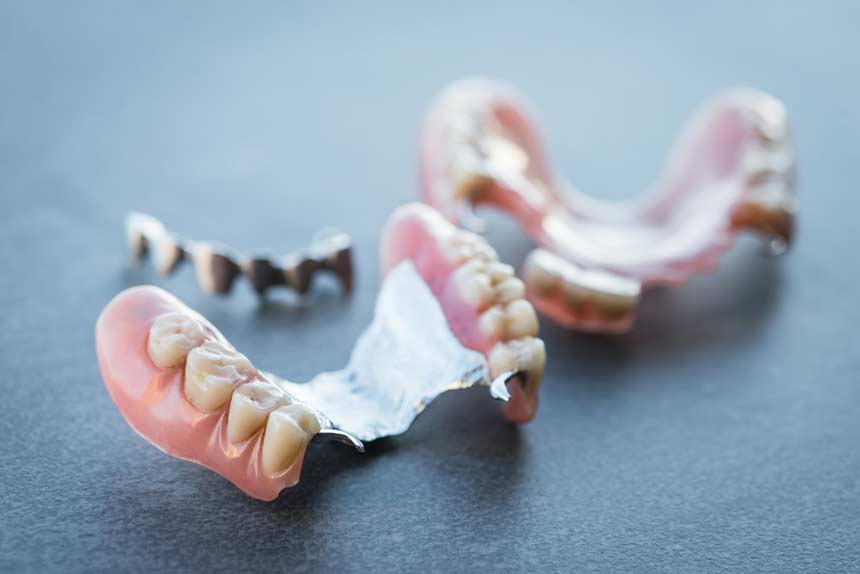
One question frequently asked regarding dentures is when should they be replaced and under what circumstances. The lifespan of dentures lasts between four and twenty-five years. Hence, it is expected that all denture wearers must undergo denture replacement at one stage or another. Normally, replace your dentures every four to eight years at least as your jaw structure changes. According to the Australian Dental Prosthetist Association, there are various influences as to why dentures need replacement.
In the first instance, there is the normal wear and tear factor related directly to the denture. However, it’s more likely that the cause of denture replacement will be determined by a problem in your mouth. Your denture can be the cause of gum irritation and affects the tissues in the mouth. This is true especially if your denture is loosely fitted and prone to movement.
Due to the fact that you’re not having natural teeth, your gum tissue will diminish because of a lack of support in retaining it. This also has the effect of loosening the denture. In addition, a receding of the jawbone will occur due to a lack of binding tooth roots. If your dentures are affecting your personal confidence because of an inconvenient movement within your mouth, this is definitely an indication that it is time for a new denture to be replaced.
Defining Denture Replacement
There are no clearly defined general conditions as to when a complete denture should be replaced. However, for a healthy person, a denture will usually require replacement every four to eight years on average. The need for a complete denture replacement is generally related to the deterioration of the materials utilised in denture construction.
Alternatively, it can be determined by irreversible changes in the jaw contour of the wearer, which is adversely affecting the denture fitting. However, there are also individual considerations surrounding a decision to replace a denture. Every denture wearer has his or her own particular needs and requirements. These are influenced by a variety of factors determined by a qualified denture prosthetist. Consequently, these factors are taken into account in the evaluation of a denture replacement.
A defining term related to denture replacement is the vertical dimension. It is a physical measurement made by your dental prosthetist, from a point on the tip of your nose to one on your chin. This is a unique measurement applicable to each individual and one that is essential to be assessed. It serves a very important purpose. For instance, after a loss of natural teeth, your jawbone changes in shape resulting in a decrease in its overall size. During this process, the previously accurate denture fitting becomes loose and unstable. Adding to this condition is the factor of the wearer losing their vertical dimension.
In everyday terms, it means the nose of a person and their chin could have been drawn closer together. Many people wear the same and complete dentures for extended time periods, during which they suffer significant loss of their vertical dimension. This is although a slow procedure, yet it is a progressive one. Denture wearers may gradually adapt to their conditional changes including the hollow, shrunken facial appearance, especially in the mouth area.
A further aspect is a possibility of the temporomandibular joints being adversely affected, with the ability to function potentially becoming compromised. But, a corrective measure is possible in the form of additional pink denture plastic. It is added to the inside of a loose denture, known as denture relining. This is done in order to achieve a reasonable degree of stability. However, an unfortunate part of this process is that it does not accurately restore the optimal vertical dimension. Dental Prosthetists generally consider it necessary to construct a replacement denture when the vertical dimension has been reduced by 3 millimetres.
Denture Wear and Tear
Another aspect related to denture replacement concerns the important issue of “tooth wear”. In addition to the limited ability to chew your food comfortably and effectively, the excessive wear to your teeth adversely affects the aesthetics and contribute to issues associated with a loss in the vertical dimension. The deterioration of the materials used in creating the dentures is also an aggravation that requires denture replacement.
Although the materials used in the manufacture of dentures today are reasonably durable, but inescapable deterioration, dimensional changes, and wear will eventually occur over a period of time. These are factors that will cause dentures to become dysfunctional and require replacing.
In the event of a relining denture being fitted due to the aging process, the pink denture plastic forfeits its natural enhancing appearance and texture. Thereby, it gives the appearance of artificial dentures. Added to this is the potential for denture plastics to become significantly contaminated with microorganisms. This can cause irritations of the mouth, socially unacceptable mouth odours as well as an unpleasant taste.
In all respects, it is essential that a visit to your dental prosthetist be made on a regular basis. Observing regular checkups (one to two years) helps in maintaining optimal oral care and overall maintenance for your dentures.











